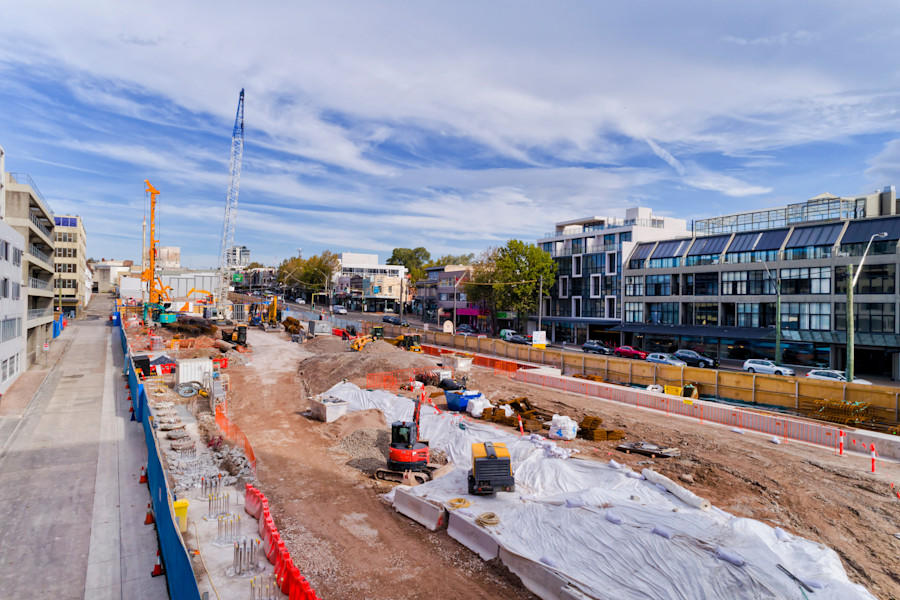The recent decision of The Eddie Arnott Corporation Pty Ltd v Sydney Metro (No 4) [2025] NSWLEC 103 is a timely reminder for people impacted by compulsory acquisitions to obtain expert legal advice to guide them through the process and ensure their claim is appropriately framed.
Background to the Case
The case concerns an objection in Class 3 of the Land and Environment Court to the amount of compensation offered by Sydney Metro following the compulsory acquisition of a shop located on the lower ground level of the former Hunter Connection used for a dental practice.
During the proceedings, Dr Arnaout was joined as the Second Respondent. The Eddie Arnott Corporation Pty Ltd (the EA Corporation) was a corporate trustee and Dr Arnaout was its sole director/secretary. Dr Arnaout also operated the dental practice at the shop.
Dr Arnaout claimed that his entitlement to compensation arose from an unregistered lease that was executed by the Applicant and Dr Arnaout 11 days prior to the date of acquisition but backdated to 1 year earlier.
During the proceedings, Dr Arnaout appeared in person for both the EA Corporation and himself. The EA Corporation and Dr Arnaout's expert town planning and valuation evidence was not admitted into evidence as the experts were not made available for cross-examination and had not participated in joint conferencing.
Issues before the Court
The EA Corporation and Dr Arnaout claimed compensation under the Land Acquisition (Just Terms Compensation) Act 1991 (Just Terms Act) for:
- Market value under s55(a);
- Special Value under s55(b); and
- Numerous items of loss attributable to disturbance under s55(d). In relation to Dr Arnaout's claim, a threshold issue for the Court to determine was whether Dr Arnaout had a compensable interest in land as that term is defined in s4 of the Just Terms Act.
The Court's findings
Findings in relation to Dr Arnaout
- Overall, the Court found Dr Arnaout to be an unreliable witness. The Court found that, as judicial valuer, it was left in a position where it is unable to attach little, if any, weight to Dr Arnaout’s oral evidence in the absence of any corroborating documentary evidence.
- Further, Dr Arnaout declined to give evidence in a manner that abided by the Court’s directions, rulings and admonitions.
- In addition, the Court found that Dr Arnaout did not make his experts available for joint conferencing or cross-examination, but sought to give evidence both from the bar table and in the witness box in relation to matters which ought properly to have been the subject of expert evidence.
Joint Occupancy Claim
- A large portion of the EA Corporation's claim rested on the assertion that it (as corporate trustee) was not a mere landlord/property investor but that it occupied the shop as its "management office" jointly with Dr Arnaout, who was operating the dental surgery. However, the EA Corporation and Dr Arnaout did not provide any documentary evidence of a lease during the 16 years which the EA Corporation owned the shop (beside the unregistered lease executed 11 days prior to the acquisition), nor of any rental amounts paid by the Dr Arnaout to the EA Corporation.
- The Court held that it could not find there to have been any form of agreement for the EA Corporation to occupy the acquired land jointly with the Dr Arnaout Any permission to occupy, if it existed, was purely personal and terminable at will. The Court held at [133] that this was "not an interest upon which a claim for special value or for loss attributable to disturbance can be advanced".
Assessment of the EA Corporation's Claims
Market value - s55(a)
- The Court agreed with Sydney Metro's value that the appropriate valuation approach of the freehold interest was based on recent market transactions and the capitalisation of net market rentals. In utilising this method, the Court determined market value of the shop in the amount of $1,070,000.
Special value - s55(b)
- Section 57 of the Just terms Act provides that "special value of land means the financial value of any advantage, in addition to market value, to the person entitled to compensation which is incidental to the person's use of the land."
- The EA Corporation claimed $3.5 million for special value whilst Dr Arnaout claimed $436,000. The essence of the claim was that, as the EA Corporation could not find new CBD premises for the same purchase price as the market value of the acquired interest, the land must have some special value not captured within market value.
- The Court rejected the EA Corporation's claim for special value for the following reasons:
- the replacement value of a freehold interest held for investment purposes did not constitute special value within the meaning of the Just Terms Act;
- there was no financial value of any advantage in addition to market value to the EA Corporation that was incidental to its use of the acquired land;
- the EA Corporation did not "use" the acquired land as at the acquisition date as required by s57.
Disturbance - s55(d)
- The EA Corporation claimed various amounts under s59(1)(a) including costs from three different law firms. The Court found that this claim was excessive but was satisfied that the EA Corporation had obtained advice at various points in time in relation to the acquisition and allowed an amount of $10,000.
- The Court also allowed $22,000 for valuation fees under s59(1)(b).
- The EA Corporation claimed $126,816 for relocation costs under s59(1)(c) including for storage costs, buyer's agent fees, financial advice, accounting advice, and town planning advice.
- The Court dismissed the claim for relocation costs as:
- EA Corporation did not occupy the acquired land at the date of acquisition;
- if wrong on that, any occupation was of a trivial, de minimis nature, which ought to be disregarded; and -it was not satisfied on the evidence, of any genuine intention by the EA Corporation to relocate, nor that any relocation would have been reasonable given the EA Corporation owns at least two other investment properties.
- Further, in the absence of any evidence as to the unquantified storage costs, buyer's agent, financial advice, accounting advice, and town planning advice, the Court was not satisfied that the EA Corporation had incurred such costs or and could not determine the reasonableness of the amounts claimed.
- Similarly, the claim for stamp duty under s59(1)(d) also failed as the essential element that there be a relocation was missing.
- Finally, the claim under s59(1)(f) also failed as there was no evidence sufficient to prove, an "actual use of the land" by the EA Corporation as required by s59(1)(f).
Dr Arnaout's Leasehold Claim
Compensable interest in land
- The term "Interest in land" is defined in s4 of the Just Terms Act to mean:
- a legal or equitable estate or interest in the land, or
- an easement, right, charge, power or privilege over, or in connection with, the land.
- The Court of Appeal considered the meaning of "interest in land" in Olde English Tiles Australia Pty Ltd v Transport for New South Wales [2022] NSWCA 108 and held that the holder of a bare licence or permission to occupy land, terminable at will by the owner, has no foundation or interest on which to build a claim for compensation under the Just Terms Act.
- The Court held that she was not satisfied that the executed lease, being unregistered and for a period of greater than three years, was a legal interest in land. That is because, in accordance with the Retail Leases Act 1994, a retail shop lease for more than three years must be registered within 3 months following its execution. Further, in the 16 years the EA Corporation owned the shop, there had never been a registered lease on title.
- The Court then considered whether the lease could be capable of constituting an equitable interest in the land. Sydney Metro submitted that an unregistered executed lease may be capable of constituting an equitable interest, but whether that is so will depend upon whether the agreement underlying the instrument is specifically enforceable.
- Specific performance will not ordinarily be ordered unless:
- there is a valid and enforceable contract at law at a time when the order is sought which, in turn, includes whether there was an intention to create legal relations;
- the party seeking the relief is ready, willing and able to comply with the terms of the lease; and
- there has already been a payment of rent under the agreement or otherwise the situation of non-payment of rent has been remedied before specific performance will be granted.
- In the present case, the Court held that it could not be satisfied that Dr Arnaout had a relevant equitable interest in the land that was capable of being the subject of an order for specific performance. In particular, there was no documentary evidence which established the payment of any rent in accordance with the lease.
- This finding was sufficient to dispose of all claims for compensation advanced by Dr Arnaout. Nevertheless, the court considered the claims briefly in case it was wrong on the question of the equitable interest.
Claim for special value - s55(b)
In relation to the special value claim made by Dr Arnaout, the Court was not satisfied that the claim valid because:
- The identified advantage claimed by Dr Arnaout was a historical use to operate the dental business for a period of 16 years prior to the acquisition date. A claim based on duration of occupation does not itself constitute special value.
- There was not a sufficient connection between any advantage incidental to Dr Arnaout's use of the shop as the claimed leasehold interest would only have commented on the date of execution, 11 days prior to the date of acquisition. Further any loss of the future use of the leasehold by the dental business post-acquisition would be captured in the market value of that interest in land.
- The apparent advantage claimed by Dr Arnaout was not the subject of expert evidence.
Disturbance - s55(d)
- Dr Arnaout's claim for miscellaneous items of loss attributable to disturbance including costs for temporary storage, costs of replacing outdated dental materials and a fully search-engine-optimised website were not identified by reference to the relevant legislative provisions and no evidence was provided to support the claims.
- The claim for relocation costs under s59(1)(c) also failed as Dr Arnaout did not relocate the dental business. Instead, the business was extinguished upon acquisition. Further, the fit out of the shop was evidently affixed to the lot and common property prior to the execution of the lease. In the ordinary case, fixtures run with the land for the benefit of the freehold owner.
- Finally, a claim for "rental difference" in the amount of $352,076 was unsupported by expert evidence and the basis for the claim was unclear. The Court was not satisfied as a matter of statutory construction, or on any sufficient evidence, that the cost of new rental premises is a financial cost within the meaning of s59(1)(f) of the Just Terms Act.
Outcome and lessons for landowners
Pritchard J ultimately determined compensation payable to the EA Corporation in the amount of $1,070,000 for market value, $10,000 for legal costs and $22,000 for valuation fees, totalling $1,102,000.
This is potentially far less than the claimants may have been entitled to had they obtained suitably qualified legal representation and adduced appropriate expert evidence.
Contact our team
If you have any questions about this case or would like any assistance with compulsory acquisition matters in NSW or Victoria, please contact our Environment & Planning Team.
All information on this site is of a general nature only and is not intended to be relied upon as, nor to be a substitute for, specific legal professional advice. No responsibility for the loss occasioned to any person acting on or refraining from action as a result of any material published can be accepted.
 Client portal
Client portal














